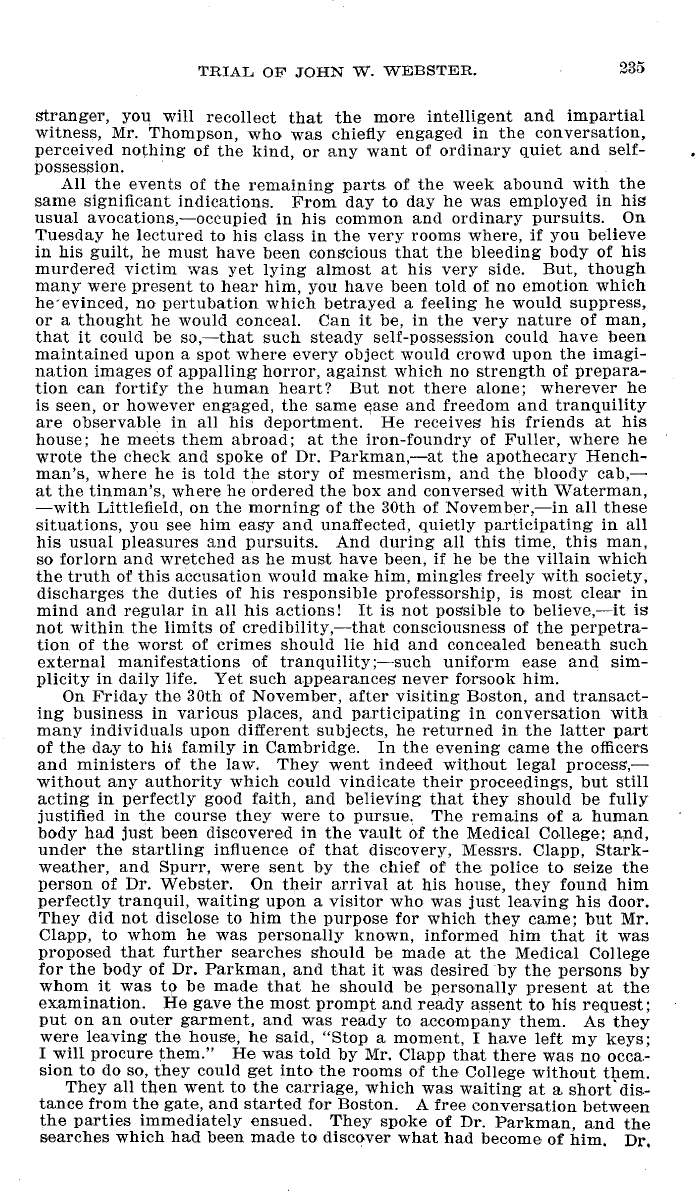|
TRIAL OF JOHN W. WEBSTER. 1)35
stranger, you will recollect that the more intelligent and impartial
witness, Mr. Thompson, who was chiefly engaged in the conversation,
perceived nothing of the kind, or any want of ordinary quiet and self-
possession.
All the events of the remaining parts of the week abound with the
same significant indications. From day to day he was employed in his
usual avocations,-occupied in his common and ordinary pursuits. On
Tuesday he lectured to his class in the very rooms where, if you believe
in his guilt, be must have been conscious that the bleeding body of his
murdered victim was yet lying almost at his very side. But, though
many were present to hear him, you have been told of no emotion which
he-evinced, no pertubation which betrayed a feeling he would suppress,
or a thought he would conceal. Can it be, in the very nature of man,
that it could be so,-that such steady self-possession could have been
maintained upon a spot where every object would crowd upon the imagi-
nation images of appalling horror, against which no strength of prepara-
tion can fortify the human heart? But not there alone; wherever he
is seen, or however engaged, the same ease and freedom and tranquility
are observable in all his deportment. He receives his friends at his
house; he meets them abroad; at the iron-foundry of Fuller, where he
wrote the check and spoke of Dr. Parkman,-at the apothecary Hench-
man's, where he is told the story of mesmerism, and the bloody cab,-
at the tinman's, where he ordered the box and conversed with Waterman,
-with Littlefield, on the morning of the 30th of November,-in all these
situations, you see him easy and unaffected, quietly participating in all
his usual pleasures and pursuits. And during all this time, this man,
so forlorn and wretched as he must have been, if he be the villain which
the truth of this accusation would make him, mingles freely with society,
discharges the duties of his responsible professorship, is most clear in
mind and regular in all his actions! It is not possible to believe,-it is
not within the limits of credibility,-that consciousness of the perpetra-
tion of the worst of crimes should lie hid and concealed beneath such
external manifestations of tranquility; such uniform ease and sim-
plicity in daily life. Yet such appearances never forsook him.
On Friday the 30th of November, after visiting Boston, and transact-
ing business in various places, and participating in conversation with
many individuals upon different subjects, he returned in the latter part
of the day to his family in Cambridge. In the evening came the officers
and ministers of the law. They went indeed without legal process,-
without any authority which could vindicate their proceedings, but still
acting in perfectly good faith, and believing that they should be fully
justified in the course they were to pursue. The remains of a human
body had just been discovered in the vault of the Medical College; and,
under the startling influence of that discovery, Messrs. Clapp, Stark-
weather, and Spurr, were sent by the chief of the police to seize the
person of Dr. Webster. On their arrival at his house, they found him
perfectly tranquil, waiting upon a visitor who was just leaving his door.
They did not disclose to him the purpose for which they came; but Mr.
Clapp, to whom he was personally known, informed him that it was
proposed that further searches should be made at the Medical College
for the body of Dr. Parkman, and that it was desired -by the persons by
whom it was to be made that he should be personally present at the
examination. He gave the most prompt and ready assent to his request;
put on an outer garment, and was ready to accompany them. As they
were leaving the house, he said, "Stop a moment, I have left my keys;
I will procure them." He was told by Mr. Clapp that there was no occa-
sion to do so they could get into the rooms of the College without them.
They all then went to the carriage, which was waiting at a, short dis-
tance from the gate, and started for Boston. A free conversation between
the parties immediately ensued. They spoke of Dr. Parkman, and the
searches which had been made to discover what had become of him. Dr.
|

